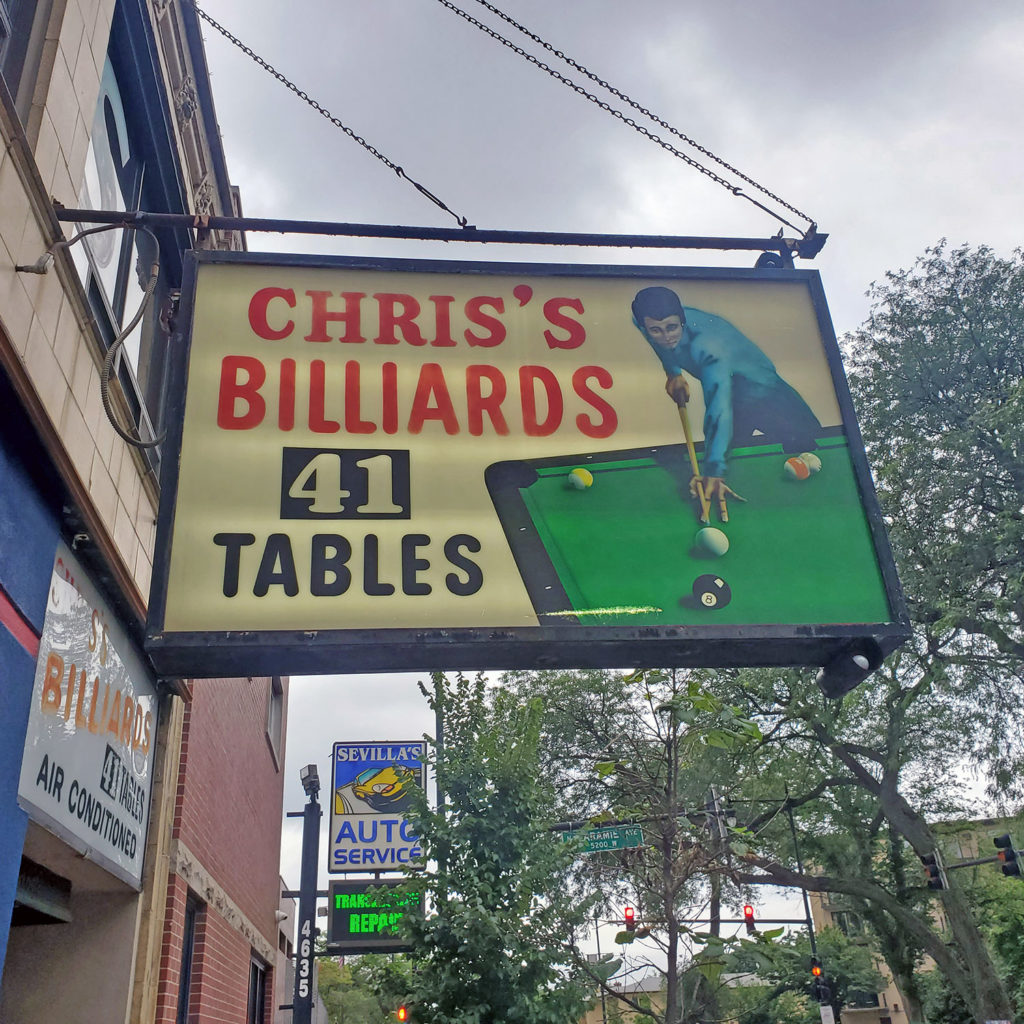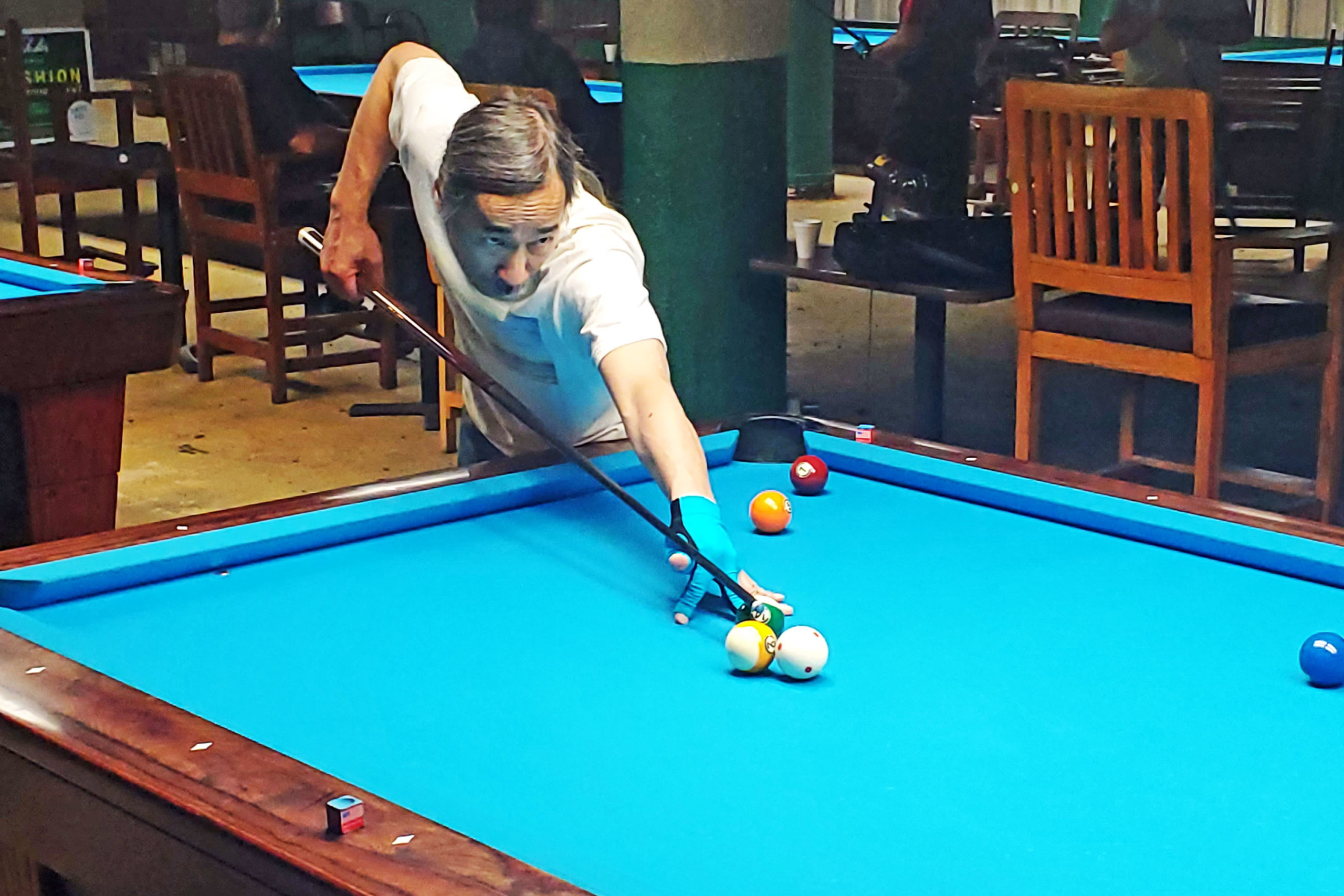Whenever I climb the worn, dimly-lit cement stairwell to Chris’s Billiards, the pool hall at Milwaukee and Wilson, I feel the ghost of Waterdog, the junky hustler who slept in a Lincoln Town Car in the parking lot, and got his fixes at the park fieldhouse across the street, because the owner wouldn’t let him shoot up in the bathroom.
Even in life, Waterdog was a ghost — the remains of Donnie Edwards, who once shot so straight he hustled a $30,000 payday in North Carolina and finished second at the 1981 National Pool Classic, here in Chicago. By the time I met Waterdog, drugs had so scrambled his coordination that he was stringing along from one score to the next by winning $5 nine-ball games against eggs — novices with no speed — and giving $30 lessons to players who remembered when “he’d walk into the room like a gunslinger,” when “you mentioned the guy’s name, nobody wanted to play him.”
Waterdog — he got his nickname because he was from Waterbury, Connecticut, and he was getting dogged at the table one day — was not so formidable in middle age. His cheeks were winnowed, his mustache looked enormous on his gaunt face, he dressed in baggy corduroys and cracked sneakers, and he walked with a limp: The cops had tackled him and broken his femur while he was fleeing a drug bust.
“Some people say I might have been a world champion” if not for heroin, Waterdog told me. “I know it messed up everything else in my life. Every time I had a relationship with a woman, it made it pretty much a shambles. It’s not something I’d recommend.”
Waterdog died in a nursing home in 2006. He’d put on a lot of weight toward the end of his life. In the last picture I saw of him, he looked content. He was in his early 50s. Most junkies wear out by then.
By the standards of the streets, Waterdog was homeless, but he had a home of sorts at Chris’s. A pool room is a marginal world that has a place for a character as marginal as Waterdog. I went to Chris’s last Sunday night, to play in the $20-a-head nine-ball tournament, and to see whether there’s still as much action as there was in Waterdog’s day.
In the middle of the gloomy room, at a table illuminated by an overhead lamp, Ken “Chopstix” Lee was playing one pocket for $50 a game with his buddy John “Baby Ghost” Daminato. (Every real pool player has a nickname. At Chris’s, you’ll also meet Pappy, Cowboy, Rocket Man, Chino, Chicago Fats and BBQ — “because I barbecue everyone else,” he says.) Chopstix is a seasoned player — he’s been haunting Chris’s since he was a senior at Senn High School, in the 1970s — so he’s spotting Baby Ghost a ball. Baby Ghost has to sink eight shots in his pocket to win, Chopstix nine. Setting the spot is the overture to any money game, as nits negotiate to even the odds with hustlers.

“This is an average game,” said Chopstix. “The most I ever played for was $2,000 a set. I won some, I lost some. There’s not too many players do that. Chicago Fats likes to gamble high. If he thinks he can win, he’ll gamble thousands of dollars.”
When Martin Scorsese filmed The Color of Money in Chicago, he was looking for a dumpy pool hall for the showdown between Vince, the cocky young hustler played by Tom Cruise, and Grady Seasons, the nation’s number-one money player. He filmed the scene at Chris’s. It’s easy to identify Chris’s in the movie because the joint hasn’t been redecorated since 1986 — the wooden chairs, the broad white pillars, the pool cue lockers and the snack bar still look exactly the same.
“They’re finally changing the carpet,” said Chopstix, explaining why we’re standing on a bare concrete floor. “They haven’t changed it in 40 years.”
The Color of Money was Chris’s moment of worldwide fame. The pool hall is still living off it, 36 years later. In a glass case outside the front door is a Life magazine cover of Paul Newman and Tom Cruise. Plastic diner letters spell out an invitation: “COME IN AND SEE WHERE TOM CRUISE AND PAUL NEWMAN SHOT THE COLOR OF MONEY.” Yeah, that’s an old-fashioned way to advertise a connection to an old movie, but Chris’s got into the movie by looking old, so why change?
Chris’s did expand after The Color of Money, due to its new popularity. The nine-ball tournament was in “the small room,” in back. The doorways between rooms are hung with clear plastic strips, like the entrances to a meat locker. The ceiling is supported by metal girders. The walls are cinderblock — and decorated with photos from The Color of Money. Phil Collins’s Hits! blared from the speakers. Not even the music had changed since 1986.
“What do you shoot at?” the man collecting the money asked me.
“Uh, I haven’t played in a couple years.”
“We’ll start you off at a 3. You’re playing Andrew. 6-3.”
My opponent was Andrew “Mack Truck” Mackey, whose nickname is a play on his surname, not a description of his style or appearance. Mack Truck is a skinny, balding dude with a week’s growth of beard and a faded “Maui” t-shirt. As a highly respected player, he was prepared to plow down his opposition and leave it bleeding by the side of the highway. Mack Truck carried a carbon fiber cue in a leather case. He wore a nylon shooting glove on his right hand. 6-3 means he had to win six games to take the match, while I only had to win three. In nine ball, players shoot at the lowest-numbered ball remaining on the table. Whoever sinks the nine wins. Theoretically, even a terrible player can get lucky. I didn’t get lucky. Mack Truck beat me 6-0. I only sank one ball, when Mack Truck left a 7 hanging at the edge of a pocket. Mack Truck, who is mellower than most competitive pool players, is patient with my no-speed novice game. After sweeping me, he even offered a lesson.
“Your stance is all messed up and that’s why you can’t shoot,” he said. “Stand facing the ball. And keep your elbow loose. Right now, your arm is too tight.”
I followed Mack Truck’s tips in the second round of the double-elimination tournament. I still lost every game. But I sank three balls.
Back in the big room, Chopstix and Baby Ghost were up to $100 a game. They weren’t taking it too seriously, though. In between shots, they rattled off pool room lingo.
“A barrel, that’s a $100 bill,” said Baby Ghost. “A dime is $1,000.”
“‘Run out’ means making every shot,” said Chopstix. “A six pack is running out six times in a row. A guy will say, ‘He put a six pack on me.’”
Baby Ghost: “Dogging is missing a shot under pressure. Dump means to lose on purpose, to set someone up for a score later.”
“Do you know why they call the area behind the cue spot the kitchen?” Chopstix asked. “When they would set up a pool table in a house, they didn’t want the cue ball to land in the kitchen, so they placed it so you would break in the opposite direction.”
“Shark means to psych someone out,” offered Baby Ghost. “You’ll say, ‘If he makes this shot, he’ll win.’”
I left Chris’s before the nine ball tournament ended. The winner’s share was $150, but Baby Ghost predicted the remaining players would “chop it up” — split the pot amongst themselves — if the action went on past midnight. At Chris’s, the action always does.



